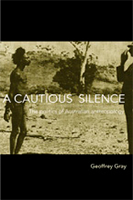A Cautious Silence: The politics of Australian anthropology
Summary
This is the first exploration of modern Australian social anthropology which examines the forces that helped shaped its formation. In his new work, Geoffrey Gray reveals the struggle to establish and consolidate anthropology in Australia as an academic discipline. He argues that to do so, anthropologists had to demonstrate that their discipline was the predominant interpreter of Indigenous life. Thus they were able, and called on, to assist government in the control, development and advancement of Indigenous peoples.
Gray aims to help us understand the present organisational structures, and assist in the formulation of anthropology’s future role in Australia; to provide a wider political and social context for Australian social anthropology, and to consider the importance of anthropology as a past definer of Indigenous people.
Gray’s work complements and adds to earlier publications: Wolfe’s Settler colonialism and the transformation of anthropology, McGregor’s Imagined destinies and Anderson’s Cultivating whiteness.
Geoffrey Gray is Research Fellow, Tradition and Transformation at AIATSIS, and Honorary Research Associate at the School of Historical Studies, Monash University. Gray has published widely on topics including anthropology, academic freedom, race and racism, colonialism, citizenship and native title.
Reviews and endorsements
'Indeed anthropology for its first century or so sought ‘pristine cultures’, which often brought it into conflict with settlement. Gray shows us how this concern for the "pristine" often meant not looking at the Aboriginal societies most changed by settlement or at urban Aboriginal communities. But as Gray suggests in his closing pages, we now enter into a deeper tension, one that has haunted the discipline since the 1960s: What is anthropology? And why has it, and does it, gaze at Aboriginal Australians at all? There are more questions raised by A Cautious Silence than are answered. It may not, then, be a definitive study, but it is an invaluable contribution.'
— Robert Kenny, History Australia, Vol. 5, No. 2, 2008
'We've all been told not to judge a book by its cover, but in the case of Geoffrey Gray's A Cautious Silence: the politics of Australian anthropology, the cover design offers a somewhat more reliable insight into the book's contents than its subtitle does.'
— Will Owen, Aboriginal Art & Culture: an American eye, Anthropology Minor, December 2008
'I suggest that Gray’s work is of considerable importance in demonstrating the detail of engagements between the discipline of anthropology and Australian government, especially concerning policy formulated ‘for the benefit of’ Indigenous people. It illustrates in useful detail how not to go about doing research with, for and among Indigenous people, but says little about how to read from this a hopeful future for social science in Australia.'
— Sally Babidge, The Australian Journal of Indigenous Education, Vol. 37, December 2008
'The greatest value of his book lies in its narrative detail, reporting the research experiences and conclusions of a large cast of anthropological characters.'
— Henrika Kuklick, Australian Historical Studies, Vol 40, 2009
'This is plain-speaking history which insists on the illumination of transparent, yet messy and contradictory, details gleaned from a broad archive.'
— John Morton, The Journal of Pacific History, Vol. 44, No. 1, June 2009
